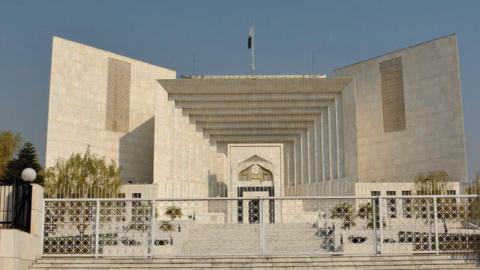The decision by Pakistan’s Supreme Court on Thursday to acquit four men involved in the kidnapping and beheading of Wall Street Journal reporter Daniel Pearl in 2002 comes at a bad time for Pakistan.
Hoping to overcome longstanding allegations of supporting terrorism, Pakistan’s leaders helped U.S. negotiators in their talks with Afghanistan’s Taliban. The acquittal of Ahmed Omar Saeed Sheikh—mastermind of the Pearl kidnapping—against U.S. advice is likely to attract renewed scrutiny of Pakistan’s terrorist links.
It could also jeopardize Pakistan’s efforts to get off the United Nations “gray list” of countries with inadequate controls over terrorism financing.
-- Mr. Sheikh is an unrepentant jihadist terrorist who lured Mr. Pearl on the pretext of an interview and handed him over to al Qaeda associates. Khalid Sheikh Mohammed, mastermind of 9/11, bragged about beheading the reporter during a hearing before a military tribunal at Guantanamo Bay.
Mr. Mohammed’s boast became grounds for Mr. Sheikh’s appeal in the Pakistani courts. But while Mr. Mohammed may have wielded the sword that killed Mr. Pearl, Mr. Sheikh played the key role in the terrorist kidnapping and brutal murder.
Mr. Sheikh had previously kidnapped three British tourists and an American in Kashmir in 1994 and was arrested in India after being shot by Indian police. He was released from an Indian prison, along with two other terrorists, on Dec. 31, 1999, in exchange for passengers on an Indian plane hijacked to Kandahar, in then Taliban-controlled Afghanistan.
The modus operandi in both kidnappings was similar. Mr. Sheikh, who had studied at a British private school and the London School of Economics, befriended his victims to ensnare them.
The British and American tourists in the 1994 Kashmir kidnapping were found alive by Indian authorities. Mr. Pearl was killed as part of al Qaeda’s effort to spread terror in the aftermath of 9/11. An American indictment followed, but Pakistan’s government promised to prosecute Mr. Sheikh rather than extradite him.
Soon after his conviction in 2013, Mr. Sheikh said he did not expect to be executed. “It is a decisive war between Islam and Kafirs,” he declared, using an Arabic word for infidels. “And everyone is individually proving on which side he is.” In this Mr. Sheikh asserted his faith that the powers that be in Pakistan would eventually side with him, a true believer, rather than with unbelievers.
The decision by the Pakistan Supreme Court seems to vindicate Mr. Sheikh’s bravado. On its face, the court seems to have accepted his argument that he had only “a minor role” in Mr. Pearl’s death. But most observers of Pakistan’s complex relationship with jihadist groups will see the court’s decision as part of a pattern of sympathy for terrorists.
I noted that pattern in these pages as early as January 2003, soon after Mr. Sheikh’s initial arrest for Mr. Pearl’s murder. “If it wants to keep someone in prison,” I argued, “the Pakistani government usually has little difficulty finding some way to do so.”
Over the years, Pakistan has been praised by one U.S. president, George W. Bush, for its help in fighting terrorism only to be criticized by everyone else for duplicity and operating as a revolving door for terrorists. U.S. analysts have blamed Pakistan’s support for the Taliban for prolonging America’s military involvement in Afghanistan.
Many Americans haven’t forgotten that Osama bin Laden was found and killed by U.S. special forces in the northwest Pakistan garrison town of Abbottabad. The U.S. chose not to take their ostensible allies, the Pakistanis, in confidence and conducted the operation to eliminate bin Laden behind their backs.
While Pakistan has cooperated with the U.S. against al Qaeda and other international terrorist groups, it has been reluctant to act against regional terrorist groups in Afghanistan and India. After stepping down, former Pakistani President Pervez Musharraf admitted that his support for the Taliban was part of a proxy conflict with India.
Pakistan’s current military chief, Gen. Qamar Javed Bajwa, has struggled to deal with the opprobrium over his country’s mixed record on terrorism. Although Pakistan has the trappings of a procedural democracy, the civilian government led by Prime Minister Imran Khan defers to Gen. Bajwa on all military strategy.
Gen. Bajwa has spoken of the need to transform Pakistan into a “normal country” and has assured world leaders that he plans to help the county shed its jihadist-friendly image. He ordered the armed forces to meet requirements set by the U.N.’s Financial Action Task Force for dealing with terrorism financing. During his tenure, trial courts convicted the Pakistani masterminds of the 2008 Mumbai terrorist attacks on terror-financing charges.
After years of denying what was known to much of the world, Pakistan’s leaders now acknowledge that their country’s relationship to terrorism has been somewhat complicated. But Mr. Khan, who has sometimes praised terrorists and has said bin Laden was “martyred,” keeps national discourse mired in jihadist ideology, as do Islamist politicians, judges and journalists. Even ardent Western skeptics of Pakistan’s army and intelligence services would applaud if Gen. Bajwa succeeded in turning away from his predecessors’ policies. But the Supreme Court’s decision in Mr. Sheikh’s case suggests that Pakistan has a long way to go to overcome jihadism. -->
Read the full article in The Wall Street Journal















